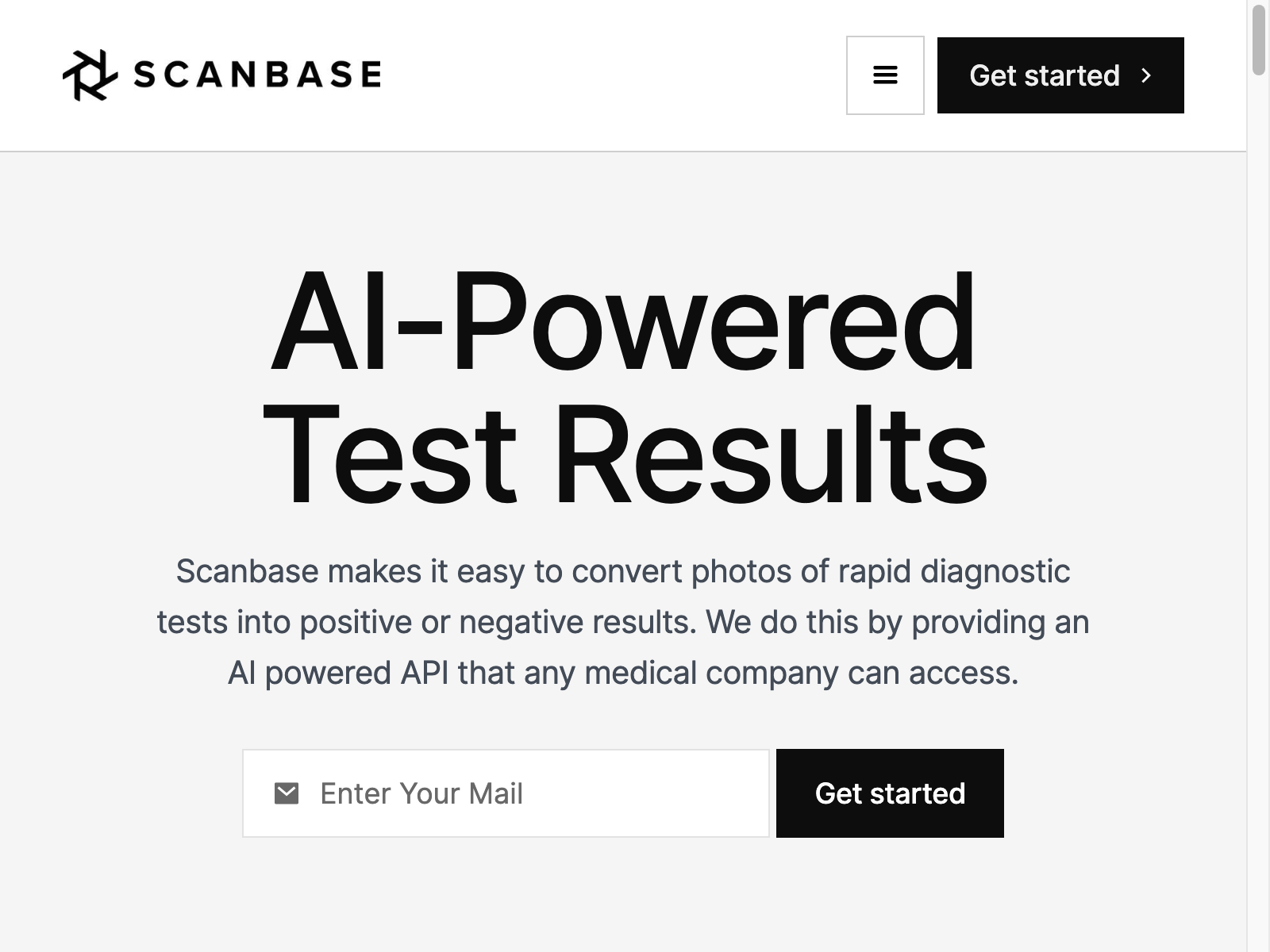Scanbase API: Revolutionizing Digital Health Diagnostics with AI
Published on
In the world of healthcare, rapid diagnostic tests play a crucial role in providing quick and accurate results. However, interpreting the results of these tests can often be a time-consuming and error-prone process. That's where Scanbase API comes in. Scanbase is an AI-powered tool that offers solutions for digital health diagnostics, specifically by converting photos of rapid diagnostic tests into positive or negative results. In this review, we will explore the various features, use cases, pros and cons, and pricing of Scanbase API to understand how it can revolutionize the diagnostic process.
Scanbase API: Simplifying Digital Health Diagnostics
Scanbase API is designed to streamline the process of interpreting rapid diagnostic tests by automating the analysis of photos. With its AI-powered capabilities, medical professionals can now swiftly and accurately interpret test outcomes using artificial intelligence. This not only saves time but also reduces the likelihood of human error, leading to more reliable results.
A notable feature of Scanbase API is its seamless integration into existing systems. Medical practitioners can easily adopt this tool into their workflows, optimizing their processes and enhancing patient care. The user-friendly interface ensures that healthcare professionals, regardless of their technical expertise, can efficiently navigate and utilize the tool. Moreover, the AI algorithms used by Scanbase API are highly accurate, allowing medical practitioners to make quick and informed decisions based on the test results.
Use Cases: Remote Monitoring, Field Diagnostics, and Telemedicine
Scanbase API offers a wide range of applications in the field of digital health diagnostics. Here are some key use cases for utilizing this tool:
-
Remote monitoring: With Scanbase API, diagnostic tests can be remotely interpreted, eliminating the need for patients to visit healthcare facilities unnecessarily. This improves convenience for both patients and healthcare providers, especially for those in remote or distant locations.
-
Field diagnostics: Medical teams operating in resource-constrained or remote areas can benefit greatly from Scanbase API. The tool allows accurate interpretation of test results in challenging environments where access to specialized facilities may be limited.
-
Telemedicine: Integrating Scanbase API into telemedicine platforms enables healthcare providers to efficiently assess and monitor patients from a distance. This tool becomes particularly valuable when remote consultations require rapid diagnostic test results.
Key Features of Scanbase API
Scanbase API offers several key features that simplify the diagnostic process and enhance its accuracy:
-
Rapid test analysis: By leveraging AI algorithms, Scanbase API can automatically interpret photos of rapid diagnostic tests. This feature provides quick and reliable results, eliminating the need for manual analysis and reducing the turnaround time for test interpretations.
-
AI-powered accuracy: The advanced AI algorithms used by Scanbase API ensure high accuracy in interpreting test outcomes. This reduces the risk of human error and provides medical professionals with more reliable results to base their decisions on.
-
Easy integration: One of the standout features of Scanbase API is its user-friendly interface and straightforward integration process. This seamless integration into existing systems ensures that medical practitioners can adopt the tool without disruption to their workflows, optimizing the diagnostic process.
-
Cloud-based API: Scanbase API is cloud-based, offering accessibility from anywhere with an internet connection. This makes it convenient for medical professionals working in different locations or those using telemedicine platforms.
Pros and Cons of Scanbase API
As with any tool, Scanbase API has its pros and cons. Let's take a closer look at them:
Pros:
- Streamlines the diagnostic process: By automating the analysis of rapid diagnostic test photos, Scanbase API simplifies and expedites the entire diagnostic process.
- Reduces human error: The AI-powered accuracy of Scanbase API minimizes the risk of human errors in interpreting test outcomes, providing more reliable results.
- Quick and accurate results: By leveraging advanced AI algorithms, Scanbase API ensures rapid and accurate interpretations of test results, saving valuable time for medical professionals and patients.
- User-friendly interface: The user-friendly interface of Scanbase API makes it accessible to medical professionals with varying levels of technical expertise, enabling its wide adoption.
- Easy integration into existing systems: Scanbase API seamlessly integrates into existing systems, allowing medical practitioners to adopt the tool without major disruptions to their workflows.
Cons:
- Requires reliable internet connection for cloud-based accessibility: Since Scanbase API is cloud-based, a reliable internet connection is necessary for smooth and uninterrupted access to the tool.
- May lack compatibility with certain older systems: While Scanbase API offers easy integration into existing systems, older or outdated systems may have compatibility issues. It is essential to ensure compatibility before implementation.
Pricing
For detailed pricing information, it is recommended to visit Scanbase's pricing page (opens in a new tab). Scanbase API offers flexible pricing options, allowing users to choose plans that align with their specific needs and requirements. By exploring their pricing options, users can determine the best fit for their individual or organizational budgets.
Frequently Asked Questions (FAQs)
Here are answers to some frequently asked questions about Scanbase API:
-
Is Scanbase API compatible with all types of rapid diagnostic tests? Scanbase API is designed to work with a wide range of rapid diagnostic tests, offering versatility in its application. However, it is always best to refer to the documentation or consult with Scanbase for specific compatibility inquiries.
-
Are there any limitations to the number of photos that can be analyzed using Scanbase API? Scanbase API offers flexible plans to cater to varying usage requirements. It is essential to review their pricing options to determine the best fit for your needs, as the number of photos that can be analyzed may vary based on the chosen plan.
-
Can Scanbase API be integrated into existing electronic health record (EHR) systems? Scanbase API provides seamless integration capabilities, allowing for easy incorporation into existing EHR systems. This integration enhances workflow efficiency and enables medical professionals to have a unified view of patient data.
-
What level of technical expertise is required to use Scanbase API? Scanbase API offers a user-friendly interface, making it accessible to healthcare professionals with varying levels of technical proficiency. The integration process is designed to be straightforward, ensuring that users can quickly adopt and utilize the tool.
For more information and updates on Scanbase API, it is recommended to visit Scanbase's official webpage (opens in a new tab).
Conclusion
Scanbase API is a game changer in the field of digital health diagnostics. With its AI-powered capabilities, it simplifies and expedites the interpretation of rapid diagnostic tests. By automating the analysis of test photos, Scanbase API saves valuable time, reduces human error, and enables medical professionals to make informed decisions based on accurate results. The user-friendly interface and easy integration into existing systems make it accessible to healthcare professionals with varying levels of technical expertise. Whether for remote monitoring, field diagnostics, or telemedicine, Scanbase API offers a reliable and efficient solution for digital health diagnostics.

